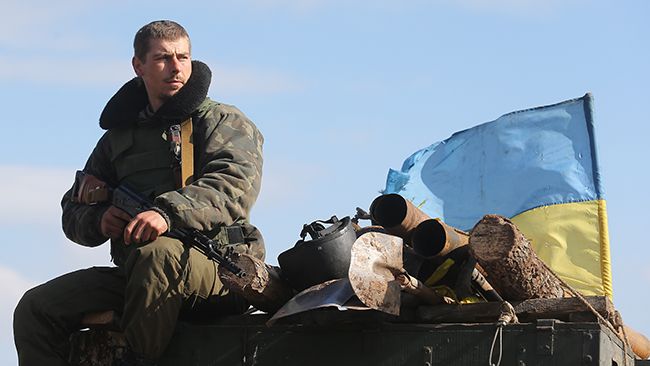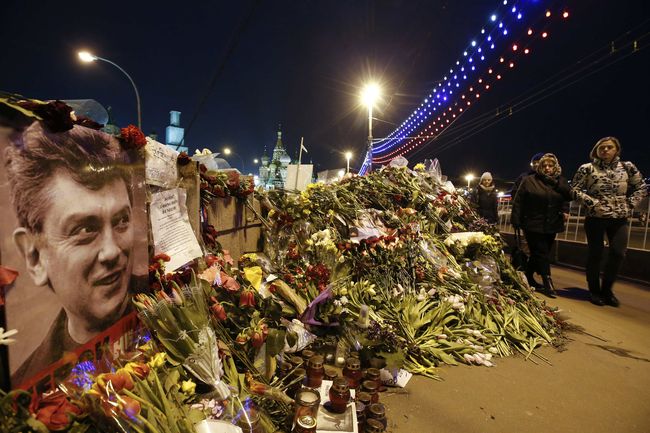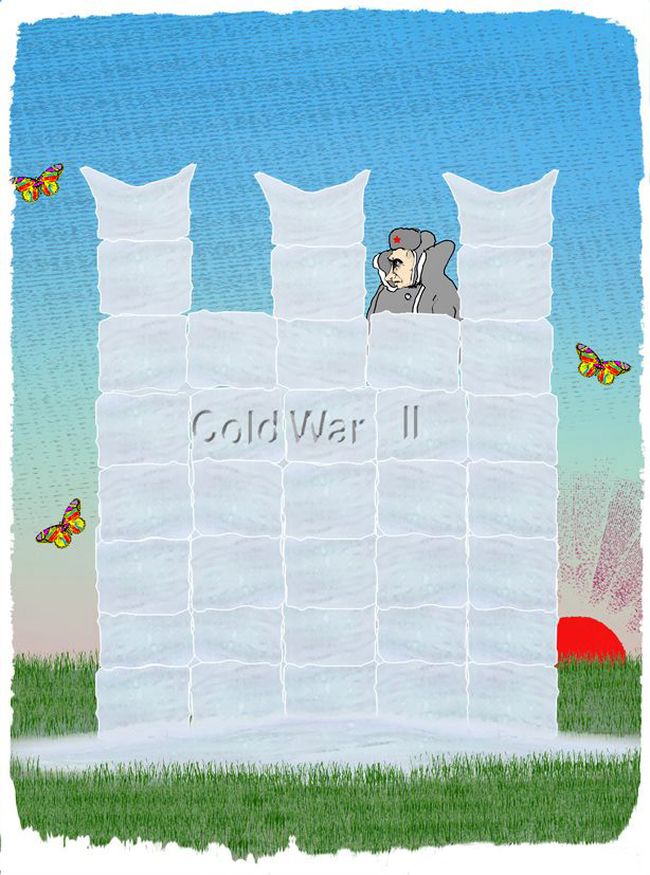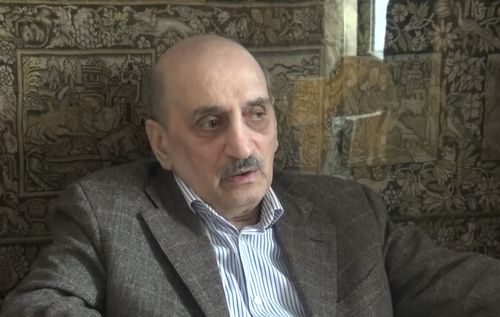“…It is a war declared on the entire European civilization”
The well-known human rights activist and dissident Sergey Grigoryants turns to the Hague court over the Russian leadership’s crimes in Ukraine...
Turning to the International Criminal Court (ICC) is a pivotal topic for Ukraine. The Kremlin’s aggression, when first Crimea was annexed and then a part of the Donbas was occupied in contravention of all legal norms, has resulted in a large number of heinous crimes against humanity. Having unleashed a war against Ukraine, the Russian leadership has brought killings, ruin, and sorrow to this country. The Day has been long insisting that Ukraine turn to the Hague court. A week ago we published a long interview with Volodymyr Vasylenko, one of the best experts on this subject, an international lawyer, a judge at the International Criminal Tribunal for the former Yugoslavia in 2002-05 (“How to make Putin face Hague Tribunal?” The Day, No. 22, April 2, 2015). In this interview, Prof. Vasylenko points out the absence of a clear-cut legal attitude of the Ukrainian state to Russia’s armed aggression (officially, we still have a counterterrorism operation, not a war), which essentially impairs the possibility of an effective protection of national interests. Another important point is that Prof. Vasylenko stresses that “Ukraine needs to produce convincing evidence in a professional manner,” in which we also have problems so far.
Today we publish an exclusive interview with Sergey GRIGORYANTS, a well-known Russian dissident, human rights activist, journalist, and chairman of the Russian Coalition in Support of the International Criminal Court, which Aleksandr Poliakov conducted specially for The Day. Mr. Grigoryants, who also participated for a number of years in drawing up the Roman Statute, recently filed an official petition to the ICC about the Russian leadership’s crimes on the territory of Ukraine, which we are also going to publish. This petition says that the recipients are not only the International Criminal Court, but also the Ukrainian government, including Prime Minister Arsenii Yatseniuk, and heads of the International Red Cross Committee and Human Rights Watch. It will be recalled that Yatseniuk announced on March 18: “The Ministry of Foreign Affairs has drawn up a statement in accordance with Article 11 of the Roman Statute, and this statement is to be sent to the Hague court. The Prosecutor General’s Office of Ukraine must urgently demand that the Hague court bring the Russian Federation to justice for the aggression against Ukraine.”
“TO PUBLICLY COME OUT AGAINST IS AN ENTIRELY DIFFERENT THING FOR DECENT PEOPLE”
Would you comment on the petition you signed?
“It is rather a difficult question. I did not sign this petition – I wrote it. Moreover, speaking seriously, I did not want to be the only one to write it. If you have seen our publication which includes the texts of a conference about the International Criminal Court and its statute, you know that it also comprises a decision to form a coalition and, accordingly, a list of the coalition members. You see, I don’t want to disclose names, but, under the coalition statute, there can be personal and collective membership. I first called two nice, in my view, people who were members of the coalition personally and as heads of their organizations. This means they could also make a choice. And, frankly speaking, to my utter surprise – which is also a typical feature of the time we are living in – these otherwise decent and courageous people told me they were responsible for their organizations, for some other people, so they would not sign this petition either personally or as leaders of their organizations. There’s nothing to hide: I called Chernichenko, a UN expert and a Diplomatic Academy professor. No, he is no longer at the Diplomatic Academy, he is at the Institute of State and Law now, and he is also a member of the Coalition in Support of the International Criminal Court. So, I asked him if he would sign. He immediately said he was taking an absolutely different stand – he thinks the Russian state committed no unlawful actions either in Crimea or in Luhansk and Donetsk oblasts. He said he had already expressed his legal point of view at some conference at the Institute of State and Law (incidentally, he was going to invite me to another conference at that place, which I think will not happen). It was clear that he was also falling off this list. There were a few people ready to sign, but I was aware that this address, which supports the Ukrainian government’s initiative to institute criminal proceedings against a number of Russian leaders for military crimes, that is, particularly grievous crimes…”
…by international classification?
“Yes. I saw that this would find a keen response, and I was afraid or, to be more exact, did not want to set up those who refused, considering that they could come under pressure – they will sign, but others will be forced to say that they were against and that the statement I wrote does not reflect the opinion of the entire coalition. Therefore, I had to do what I think is indecent: to put the word ‘I’ in the first place to ward off the impression that the statement was written on behalf of the whole coalition and not only by me as its chairman and not to put others in a moral deadlock, in a position even more difficult than the signing of this petition. To refuse to sign is one thing, but to publicly come out against is an entirely different thing for decent people.”
Is fear the main reason why others refused to sign this letter?
“Yes, of course. Well, I’ve already said: the point is not that everybody was afraid. There were some people who were ready to sign. When it became clear how difficult the situation was, I decided not to phone to some people, for example to the former USSR foreign minister Boris Pankin in Stockholm. I wanted to consult with Karina Moskalenko, a superb jurist and also member of the coalition. I was no longer going to ask her to sign. I was trying to reach her in Strasbourg, but she did not answer the phone, and I finally dropped this. In other words, there were various situations. For example, in 2000 there were people who had no fear, although the situation was also difficult. In reality, the coalition was formed in 1998, but we managed to publish our documents later. Maybe, the coalition was set up even earlier. The Roman Statute was signed in 1998, and I went to Rome, so we had formed a coalition a few years before. We held the first conference well before the coalition was formed. It was not a simple situation: I don’t know if you’ve read the statute’s text well (you can see it on my website), but it also classifies as grave the crimes of a non-international nature that have been committed on the territory of one’s own country. And you know it was the time when Yeltsin was in power, and there was a longtime horrible war in Chechnya with a lot of criminal offenses. Still, all those people were not afraid. The situation with my petition also reflects the measure of public fear which has sharply risen in the past 15 years.”
“IT IS IN THE 1990s THAT THE DEMOCRATIC MOVEMENT WAS SUPPRESSED”
Is the petition still open for being signed? Can those you failed to reach by phone still affix their signatures?
“I don’t think so. I wrote it on my behalf. I didn’t want to put any names, seeing this unexpected attitude. Nobody told me that they were against. They were saying: I must think it over, we will perhaps discuss it with our colleagues in a week, and so on. In general, it was clear that, firstly, no time is to be lost: the Ukrainian government had made its statement shortly before, and it was important, among other things, to receive support from Russia (this was, of course, a powerful stimulus for me). But the main thing is that all that talk was, of course, a preamble to refusal. All these people, with whom I had been on good terms for years, felt it awkward to say this to me straight.”
Could such events as the murder of Nemtsov have had an impact on these refusals? The degree of fear sharply rose after this event. What do you think?
“I don’t know – it may be so, although it seems to me that the assassination of Nemtsov – an ugly crime as it is – concerns, I would say, a somewhat different milieu. You see, I do not write in my petition that I am chairman of the Glasnost foundation and that this foundation was the initiator and in fact the founder of the Russian Coalition for the International Criminal Court, but the milieu, the people we cooperated with, were somewhat different from Nemtsov. Those people had nothing to do with the Russian authorities and had never striven for power. Meanwhile, the Russian liberal milieu, which has unfortunately behaved very badly in all these years, includes people who have always been hostile to Glasnost. They liked to feast their eyes on themselves in a mirror or to look a relatively decent person in the eyes of others and, nevertheless, to adapt to the situation – more terrible now and less terrible at the time, as far as attitude to society is concerned. They tried not to address the problems that crippled our country and the crimes which Russian liberals hushed up or ignored for their own benefit. For it is the 1990s that saw the suppression of the democratic movement, Democratic Russia, and Memorial as a human rights organization (it altered its statute, striking off the item that it is a nongovernmental political organization). Those years saw the shelling of a legitimate, albeit far from perfect, parliament and the establishment of the Presidential Administration, a totally illegitimate and unconstitutional supreme body of power. Finally, the horrible Chechen war began at the time. Russian history, with all its ugly episodes, had never known such thing as the so-called selective, but in fact carpet, bombings, when 60,000 Russian people were killed overnight in Grozny. And so on. In other words, the people who cooperated with Glasnost which was destroyed every year and which I restored over and over again, who took part in such important and major events as the conference ‘KGB: Yesterday, Today, Tomorrow,’ the tribunal on Chechnya, the coalition in support of the International Criminal Court, and many others, were not like Nemtosv and those who are now mourning him but, at the same time, trying to make peace with the authorities. There was a different milieu at the time. On the other hand, the killing of Nemtsov, of course, had an impact on everybody. I have not yet posted my article headlined ‘Berezovsky and Nemtsov Chose Quite a Difficult Way of Suicide’ in the Internet. We should not forget that they, as well as Chubais and Voloshyn, are the people who opened Putin the door to the Kremlin.”

REUTERS photo
“THE ASSASSINATION OF NEMTSOV IS A REMINDER TO THE RUSSIAN PEOPLE OF WHAT COUNTRY WE ARE LIVING IN”
Well, Chubais feels comfortable no matter who is in power…
“He is craftier. So is Voloshyn, although he did not attend Nemtsov’s funeral. It is Voloshyn who conducted talks in Nice, arranged by the also killed Anton Surikov and Shamil Basayev, also killed during the attack of Dagestan which was, incidentally, one of the reasons why the second Chechen war broke out and Putin came to power. You see, these people thought they were big-time players, but I believe they were small-time players who miscalculated in their plans. All that they have done is of no account for many of them. And I think the assassination of Nemtsov is, on the one hand, a reminder to all the Russian people of what country we are living in, what is going on, and how scores are settled in it, and, on the other hand, a reminder to the milieu that helped Putin come to power (to a larger or smaller extent) that old merits no longer matter and are not taken into account.”

Sketch by Viktor BOGORAD
“PUTIN HAS DECLARED WAR ON THE ENTIRE EUROPEAN CIVILIZATION”
It must be painful for you to see what is happening to the remnants of civilization in Russia – to culture, scientific research, social security, and many other fields. What is expressed by the high-sounding word combination “Russian World” and what has been created over the decades is in fact being destroyed. Do you think it is possible to preserve in some way the fruits of civilization that still remain in Russia?
“You can’t possibly predict this. If everything Putin is saying is to be translated into Russian, it is a war declared on the entire European civilization. It is a war declared on Europe, the United States, Japan, and so on, a war in which Russia does not and will not have an ally for the first time. Russia has never been in a situation like this. I wrote in one of my articles and can say it again that, no matter how hard our leaders try to deceive the Russian population with tall stories about an extraordinary alliance, the assistance of and cooperation with China, it is in reality an absolute political illusion. The Chinese premier said the other day that the Crimea question should be discussed on the international level, while the Russian government thinks that the Crimean problem has been resolved. But, of course, China’s position in the world is a far more serious matter. China has a lot its own problems, which seem to be on the increase, but still China is steadily catching up with the United States economically and scientifically. Unlike the US, which always proceeds from democratic considerations, at least in rhetoric, China may be said to be taking a pragmatic approach, but it still wants the world, in which it occupies an important place and will play one of the central roles in the near future, to be stable. And it does not need Russia at all. It can buy everything in other places and, what is more, it is not interested in cooperating with a bandit state which flouts all international norms. Therefore, there will be, of course, no cooperation with China – at least in the framework of the current Russian policies. Russia is unable to oppose the entire civilized world. The most it can expect is to be fenced with a real iron curtain so that it commits no aggression against a neighboring country. This will be of interest not only to the Baltic countries, Poland, and Ukraine (Poroshenko is dreaming of a wall), but also to Kazakhstan and even Belarus. Nobody feels safe next to Russia in the current situation. As a result, it is not very clear what will be left of Russia. The situation that existed during Stalin’s rule, when the Soviet Union in fact confronted the rest of the world before the war, will never occur again because there is no Nazi Germany and we will be unable to bring somebody up no matter how strongly we support fascists all over the world and hold, to Russia’s appalling shame, international fascist jamborees in Petersburg. In reality, the future is blurred. As for Stalin, it is clear – in the mid- and late 1930s he was preparing a war: he formed a five-million-strong army, built a staggering number of tanks, aircraft, etc. He nearly miscalculated but then seized Eastern Europe – so, this brinkmanship is just a kids’ game. It arouses no joy that the Hungarians and Greeks, you see, oppose sanctions against Russia, for this does not matter at all. Instead, the Finns and Swedes, who have never been in NATO, want to join it now. Nevertheless, when it comes to choosing between Europe and poverty-stricken Russia, neither the Greeks nor the Hungarians will remain behind with the latter. There are no chances here. These are all small-scale temporary games. And, of course, this is all directly linked with the destiny of the Russian people and of Russian civilization, a great civilization. A gigantic empire created not only a marvelous culture, but also a unique type of character and mentality which really differs from the European and still more from the American type. Unfortunately, Russia keeps on saying that we had remarkable composers, such as Tchaikovsky, Mussorgsky, and Stravinsky, and artists, and Dostoevsky and Tolstoy, but Russia always had a fundamental problem with the system of government. Being able to set up a decent system of government, which will provide for all the rest, is by far the most important thing for any nation. Regretfully, the Russian nation, which was considerably lagging behind until recently, has now rushed headlong in the savage Middle Ages of sorts.”
Therefore, of great importance is the experience Ukraine is gaining and the fact that its culture and civilization radically differ from what is in Russia.
“It is, of course, of great importance as an example. But, strictly speaking, why not consider Poland as an example? Unfortunately, we cannot hope, as long as the current situation in Russia prevails, that there will be a third Ukrainian influence. The first, in the 17th century, was highly beneficial; the second, in the 18th century, was also very much to the point. But in the current conditions, the best thing Ukraine can do is to fence itself off Russia with an impregnable stone wall. This is a totally different situation.”
The Day’s FACT FILE

Sergey GRIGORYANTS (b. 1941) is one of the best-known representatives of the dissident movement, who spent about 10 years in prison for anti-Soviet propaganda and human rights campaigns; a journalist; the publisher of the journal Glasnost, the USSR’s only uncensored media that was suppressed many times; chairman of the human rights foundation Glasnost; winner of the WAN international prize “The Golden Pen of Freedom”; organizer of the conferences “KGB: Yesterday, Today, Tomorrow”; chairman of the Russian Coalition in Support of the International Criminal Court; a severe critic of the Chechen war; expert in literature; collector. He lives in Moscow.
Official Address
To Mrs. Fatou Bensouda, ICC Prosecutor,
To the Government of Ukraine and
its Head, Arseniy Yatsenyuk,
To Peter Maurer, President of the ICRC,
To Kenneth Roth, Human Rights Watch CEO
From Sergei Grigoryants.
I, being the chairman of the Russian coalition in support of the International Criminal Court, being also one of the participants of the many years long work on drafting its Charter,
and, being one of the participants of the UN sponsored conference institutionalizing the ICC which was held in Rome on June 15-17, 1998, where its charter, the Rome Statute, was adopted;
and, finally, being a citizen of the Russian Federation who’s convinced that the actions of a number of leaders of my country, especially those perpetrated over the past year, constitute counts of a number of the most serious international crimes: aggression (Paragraph 1 “a” of the Article 5, Part 2 of the Rome Statute), as well as a number of war crimes which fall under the Paragraph 2 of the Article 8 of the Rome Statute and which were committed on the territories of the autonomous republic of Crimea, as well as Donetsk and Luhansk regions, constituent parts of the State of Ukraine.
These crimes were committed on a large scale as part of a plan and policy (Paragraph 1, Art. 8 War Crimes), therefore,
being guided by Article 27 (Irrelevance of official capacity), as well as Art.30 (Mental element) about persons who have intent to commit a criminal act and are criminally responsible under paragraph 2 “a” (In relation to conduct, that person means to engage in the conduct) and “b” (In relation to a consequence, that person means to cause that consequence or is aware it will occur in the ordinary course of events);
being convinced that these acts are not just criminal from the standpoint of international law, but that they have inflicted beyond repair the moral and material damage to the people of the Russian Federation as well as the Russian State as such,
I think it’s imperative that the Prosecutor of the International Criminal Court, using its own powers under Art.15 (proprio motu) and having assessed the evidence presented by the government of Ukraine (paragraph 1, art.14) as well as the numerous freely available evidence of committed crimes (including the interview of the president of the Russian Federation Vladimir Putin given by him personally, of his own free will and under no duress in a documentary Crimea: Path To The Homeland, as well as the statement of the Russia’s Black Sea Commander Fleet Admiral Kasatonov), it’s imperative that the Prosecutor should submit (in accordance with paragraph 3, art.15) to the Pre-Trial Chamber a request for authorization of an investigation.
I also address the president of the International Committee of the Red Cross Mr. Peter Maurer and the executive director of the international organization Human Rights Watch Kenneth Roth, the leaders of the organizations which took very active part in drafting and adopting the ICC Charter as well as in the process of the Russian Federation’s implementation of this Charter
with a request to support both my present address as well as that of the government of Ukraine to the Prosecutor of the International Criminal Court, and to present to the Court all supporting materials they have on the war crimes and crime of aggression committed on the territory of the autonomous republic of Crimea as well as Donetsk and Luhansk regions, constituent parts of the State of Ukraine.
Sergei Grigoryants, Chairman of the Russian Coalition in support of the International Criminal Court.
March 23, 2015
Newspaper output №:
№23, (2015)Section
Day After Day





